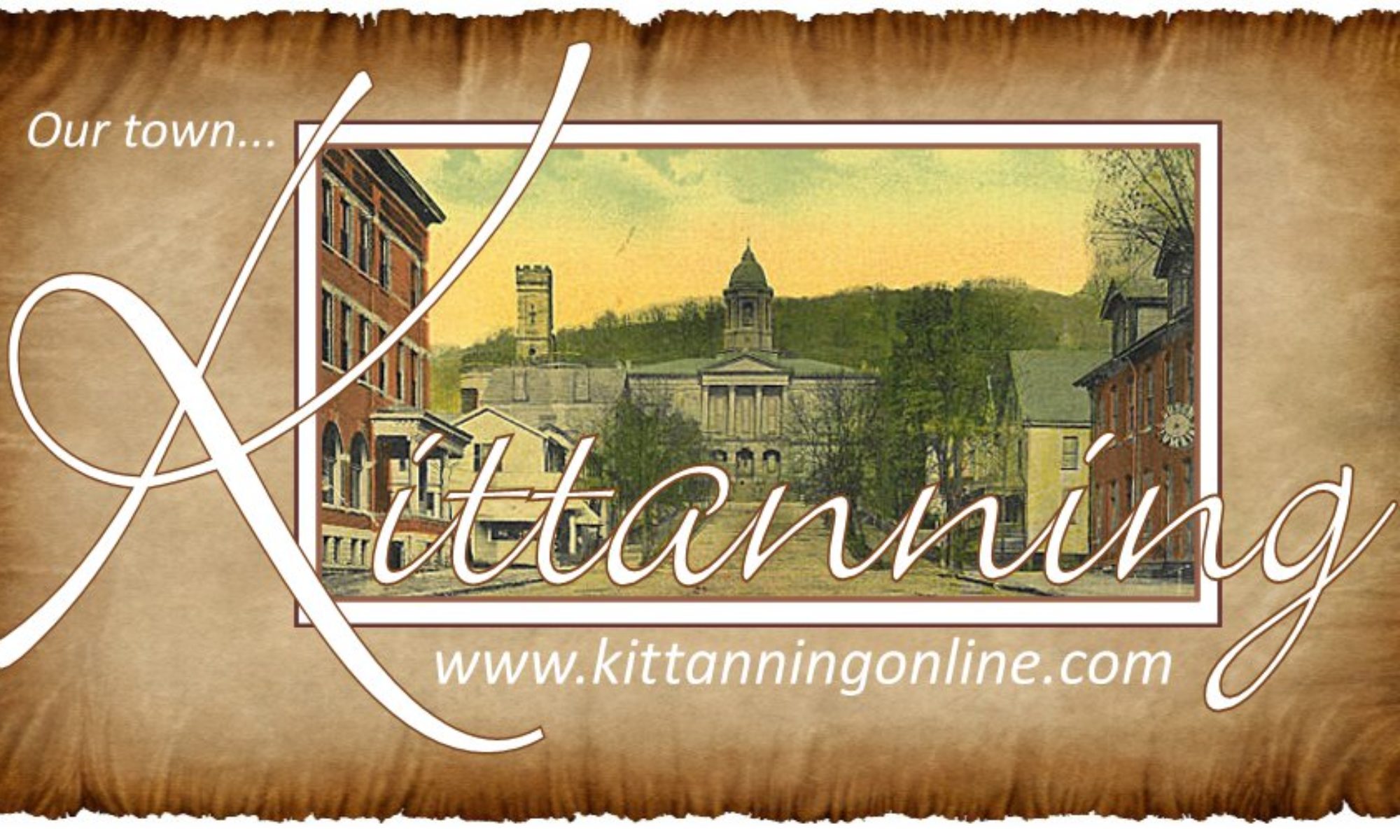By Jan Wolf Dowd – July 16, 2025
1920 – 1933 – It is January 20, 1920, the day the 18th Amendment and Volstead Act went into effect. Breweries throughout the US, including Elk Brewing Company, closed. Their employees found other jobs. Six months later, 3000 barrels of beer remained in storage at Elk Brewing. It was reported that the barrels “will be emptied into the big sewer which runs from the plant to the Allegheny River.” 1 Three days later, “Spigots were opened at the Elk Brewery, releasing 2,107 barrels of beer into the borough sewer.” 2
Some former breweries began making soft drinks, syrups for soft drinks, ice cream, and candy. There is no evidence that Elk Brewing began a non-alcoholic business after the brewery was forced to close. However, there was activity in the company’s plant. In February 1924, Elk Brewing officials leased their company’s plant on Oak Avenue to Reinhold Ice and Ice Cream Company for four years.3 During March 1930, the Harvey Electric Repair Company took over the old Elk Brewery bottling house and installed an armature and motor repair shop.4 Other companies may have used the Elk Brewing plant during 1920-1933, although no evidence has been found to support this.
1933 – 1937 – The 18th Amendment and the Volstead Act remained in effect until 1933. Why was it repealed? Authorities did not have a great deal of success in enforcing the law during the 13 years it was in effect. Many illegal activities, such as bootlegging, speakeasies, and distilling operations, began because of the prohibition of the “manufacture, sale, and transportation of alcoholic beverages in the US.” 5 On March 22, 1933, President Roosevelt signed the Cullen-Harrison Act, opening the door for breweries to begin manufacturing 3.2 beer and wine.6 As a result, Elk Brewing Company reopened. Harry Hartley (HH) Weylman returned as the brewery’s president.
Elk Brewing Company began to build its business again. It was reported on May 1, 1933, “Twenty carloads of flint beer bottles have been ordered by Elk Brewing Company in Kittanning, in order to have plenty of bottles on hand once the bottling of beer gets underway.” 7 On June 17, 1933, Harrisburg issued a permit to Elk Brewing Company.8
In anticipation of the brewery reopening, the Elk Brewing Company management invited the Armstrong people to visit the newly remodeled and equipped plant on Saturday, July 8, 1933.9 It was reported on Monday, July 10, 1933, that large crowds gathered early Saturday afternoon and “swarmed about Oak Avenue and the Elk Brewing Company plant” during the open house. 10
In July, Elk Brewing employees, along with the employees of 10 other Western Pennsylvania breweries, signed a 2-year agreement with the owners. Wages increased from 1 to 10 % with average earnings ranging from $33 to $50 per week. They also agreed to a 48-hour work week.11 The United Brewery Workers re-established headquarters in the Wabash Building in Pittsburgh. By July, Elk Brewing Company along with 14 other breweries in the Pittsburgh revenue district, were producing 3.2 beer.12
Some former employees who left Kittanning when the plant closed in 1920 returned to the area to work once again at the brewery. Charles Richard Weylman and his wife, Myrtle Johnson Weylman (my grandparents), along with their youngest daughter, Jane (my mother), returned to live in Kittanning in 1933-1934. Charles was born and grew up in Kittanning and lived in the town until 1920, when the plant closed. He and his family moved to Rochester, NY, for more job opportunities.
Charles R. Weylman is the man wearing the cap and worked as a shipping clerk.
On December 5, 1933, the 18th Amendment was repealed on the federal level when the 21st Amendment was ratified, allowing breweries to manufacture beer and wine stronger than 3.2 beer.
The re-opening of Elk Brewing Company appeared on track to be successful once again. Were they successful, and if not, what happened?
1933 – The Battle of the Use of the Name Red Top – In 1933, as breweries were opening, a dispute over the right to use the name Red Top between Elk Brewing Company in Kittanning and Red Top Malt/ Red Top Brewing Company in Cincinnati arose. A court case ensued. It appears that Red Top Malt Company began using the name Red Top on malt syrup around 1920. Barley malt syrup is a thick, unrefined sweetener produced from malted barley, a primary ingredient in beer making.13 During Prohibition, many breweries began manufacturing malt syrup for baking and candy, although people used it to make home brew.14
In the initial court case, Judge King Swope refused to grant an injunction against Joseph Papania & Company, located in Lexington, Kentucky, from selling Elk Brewing Company’s Red Top beer. The affidavit of Elk Brewing Company’s brewmaster stated that his firm had been using the name Red Top since 1907, except during Prohibition. Red Top Malt/ Red Top Brewing Company requested and was granted an appeal.15
In the appeal case, Western Pennsylvania Federal Judge F. P. Schoonmaker ruled that Red Top Malt Company and Red Top Brewing Company, both of Cincinnati, could not use the trade name Red Top in 25 counties of Western Pennsylvania. However, the Cincinnati companies had the right to use the trade name in all other territories of the United States.16
Elk Brewing Company appealed Judge F. P. Schoonmaker’s ruling. However, on August 2, 1934, Elk Brewing Company’s appeal was dismissed, ending the battle over the use of the name Red Top.17


1934 – 1937 – After more than a year fighting to use the name and sell Red Top beer beyond Western Pennsylvania, Elk Brewing Company was having financial difficulties. Further, there was information that outside unions were influencing Western Pennsylvania union brewery workers, claiming that Breweries in the region were unfair to workers. The Western Pennsylvanian Brewers Association published an ad in the Pittsburgh Sun-Telegraph denying the rumors and supporting the breweries and the union brewery workers.18
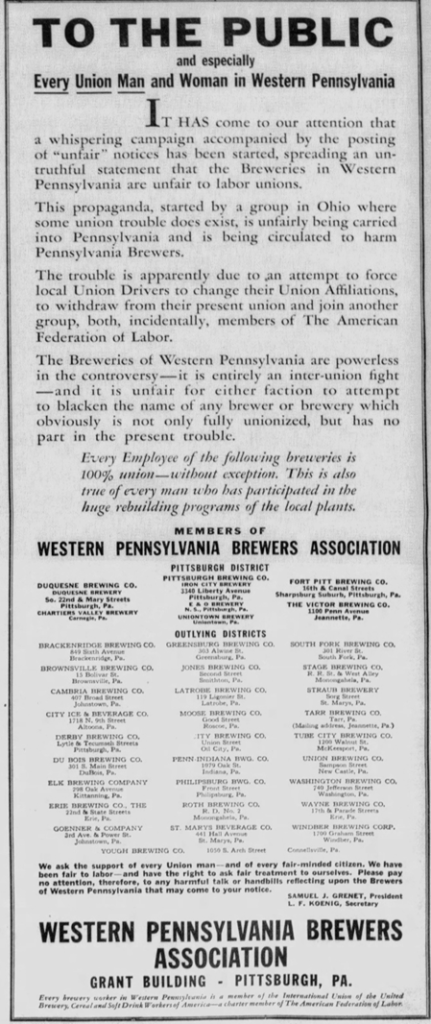
Labor unrest, as well as the Great Depression, may have also contributed to the downfall of Elk Brewing Company.

By 1934, only about one year after its reopening, Elk Brewing Company was in financial trouble. By July, Charles Weylman was looking for a job in Rochester, NY. E. E. Schaeffer, Armstrong County Commissioner, was named the receiver for Elk Brewing Company. However, the Armstrong County Tax Justice League objected to the appointment. “The tax league maintained there was too much county business on hand to permit the commissioner to use his time for the receiver’s duties.” 19 E.E. Schaeffer resigned.. In November, J. R. Patrick succeeded Schaeffer as the receiver of Elk Brewing. 20
In 1935, Elk Brewing continued to struggle. The Brewery’s President Harry Hartley Weylman died on May 19, 1935. On December 7, 1935, Elk Brewing Company shut down. It resumed operations on January 15, 1936. No information was found to determine the reason for the 5-week shutdown, but it was probably due to the Brewery’s financial difficulties.21 Eleven months later, on November 2, 1936, Judge J. Frank Graff authorized J. R. Patrick, receiver of Elk Brewing Company, “to sell at public auction properties of the company in Rayburn Township and Kittanning Borough as well as all machinery, equipment, office furniture, materials, and supplies.”22 Sometime during 1937, Elk Brewing Company permanently closed.
1938-1939 – The dismantling of the brewery began. On March 19, 1938, the Elk Brewing Company’s receiver held a public auction. Nick Kovalchick, Sagamore junk dealer, purchased the Elk Brewery property on Oak Ave. Kovalchick Salvage Company reported it will either dismantle Elk Brewery in its entirety or sell some of the buildings.23

In January 1939, Nick Kovalchick sold the first segment of the defunct Elk Brewing Company to the adjoining Continental Clay Products, Co. for $5,000.24 In April 1939, Creamy and Milk Plant Monthly reported “the former bottling plant of the Elk Brewery Company, Kittanning, PA had been bought by the newly incorporated Better Dairy Products and was being remodeled into a modern dairy products manufacturing plant.”25
Elk Brewing Company became part of Kittanning’s business history.

References
1 Simpson’s Leader-Times, Kittanning, PA, Tuesday, June 19, 1920
2 Simpson’s Leader-Times, Kittanning, PA, Tuesday, June 22, 1920
3 Simpson’s Leader-Times, Kittanning, PA, Thursday, February 14, 1924
4 Simpson’s Leader-Times, Kittanning, PA, Saturday, March 1, 1930
5 https://www.britannica.com/topic/Volstead-Act
6 https://www.britannica.com/event/Prohibition-United-States-history-1920-1933
7 Simpson’s Leader-Times, Kittanning, PA, Saturday, May 1, 1933
8 News-Herald, Franklin, PA, Saturday, June 17, 1933
9 Simpson’s Leader-Times, Kittanning, PA, Friday, July 7, 1933
10 Simpson’s Leader-Times, Kittanning, PA, Monday, July 10, 1933
11 Simpson’s Leader-Times, Kittanning, PA, Wednesday, July 12, 1933
12 Pittsburgh Post-Gazette, Pittsburgh, PA Tuesday, July 18, 1933
13 https://themobmuseum.org/blog/ten-alternative-products-made-by-breweries-during-prohibition/
14 https://www.thefitzmke.com/post/life-in-the-1920-s-malt-syrup-and-prohibition
15 Lexington Leader, Lexington, Kentucky, Sunday, October 8, 1933
16 Pittsburgh Post-Gazette, Pittsburgh, PA, Saturday, July 14, 1934
17 The Indiana Gazette, Indiana, PA, Tuesday, August 21, 1934
18 Pittsburgh Sun-Telegraph, Pittsburgh, PA, Saturday, September 19, 1935
19 The Pittsburgh Press, Pittsburgh, PA, Sunday, November 11, 1934
20 The Morning Call, Allentown, PA, Wednesday, December 11, 1935
21 Simpson’s Leader-Times, Kittanning, PA, Wednesday, January 15, 1936
22 Simpson’s Leader-Times, Kittanning, PA, Wednesday, November 2, 1936
23 The Saltsburg Press, Saltsburg, PA, Thursday, December 22, 1938
24 Simpson’s Leader-Times, Kittanning, PA, Monday, January 5, 1939
25 Creamy and Mil Plant Monthly, Volume 28, April 1939
To familiarize our readers with the current location of the Elk’s Brewing Company, I added a few photos or for those that need a recollection.
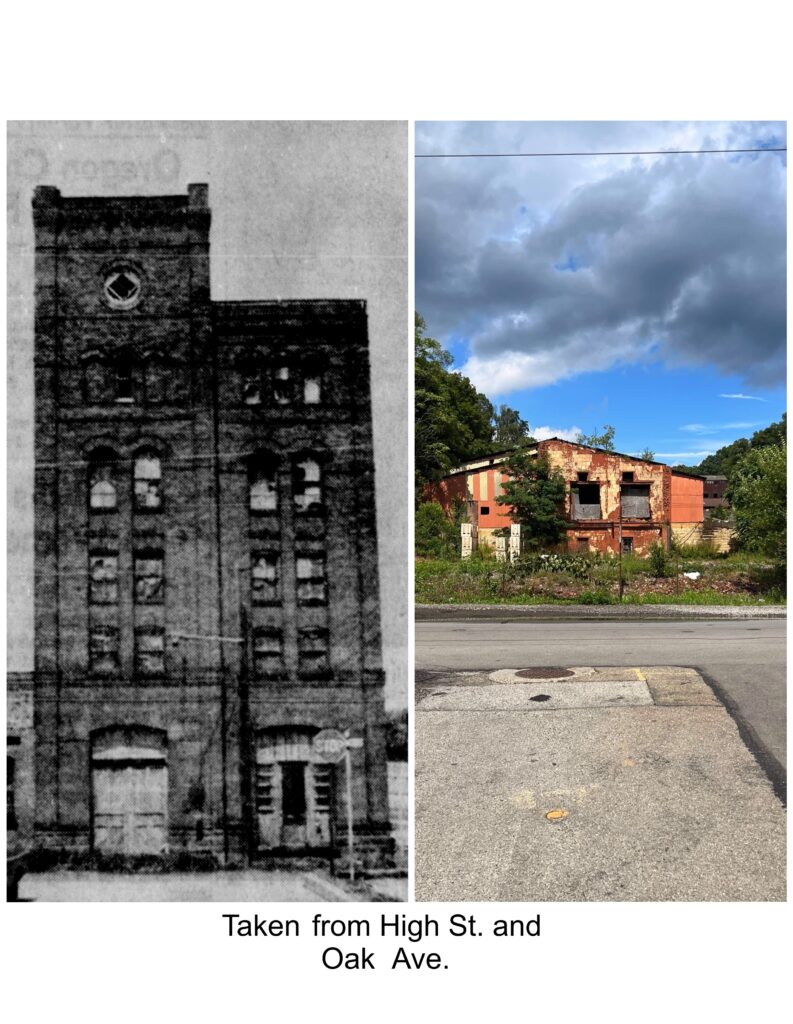
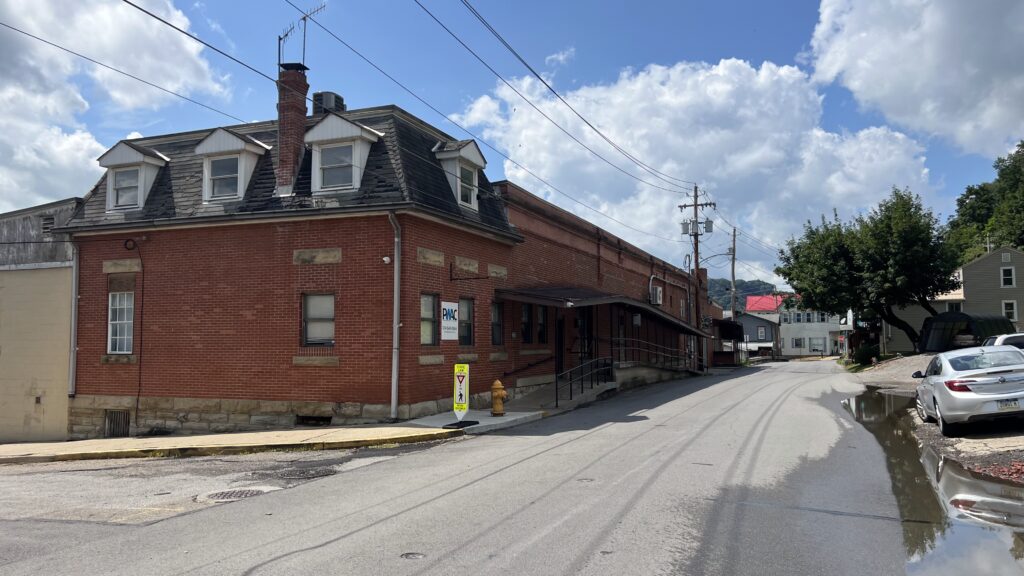
The Tear Down – I can’t recall the exact year in the 1990’s that is was torn down, but I was able to get a photo during the demolition. (Pete Harmon)
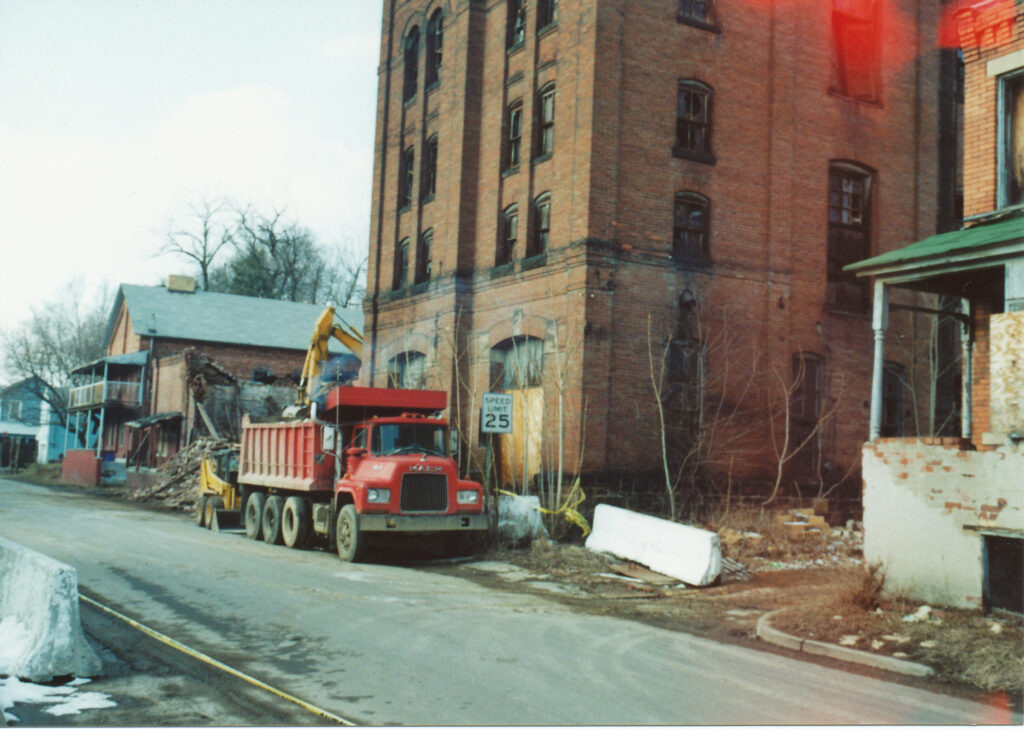
My recollection of the Elk Brewing Company was the massive staircase inside to climb. Linde Cousins and I during the 1970’s would go up there to shoot pigeons with BB guns. (Pete Harmon)
If any reader has any recollection of the Elk’s Brewing Company or family members that were employed there let us know.
Pete Harmon>pharmon54@gmail.com
Jan Wolf Dowd>jedowd@cox.net
